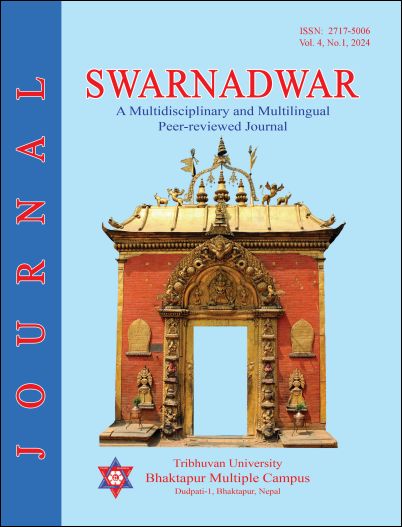Nepalese Students’ Perception Towards the Online Learning During Covid-19 Lockdown Phase
DOI:
https://doi.org/10.3126/swarnadwar.v4i1.71152Keywords:
COVID-19, Online learning, Students Perception, Students Satisfaction, Academic ProgramAbstract
The research study "Nepalese Students’ Perception towards the online learning during Covid-19 lockdown phase" has conducted during the period of Covid-19, in 2021 to examine the Nepalese students' perception and satisfaction towards on line classes. Also, it has assessed the impact and relationship between perception statements of students on their satisfaction with online classes. Total 205 students of different programs (MBS, MBA, BBA, BIM BSC-CSIT) of five constituent’s campuses of Kathmandu Valley of Tribhuvan University of Nepal is taken for sample. This study has used descriptive research design. Random sampling method has used to get the responses of respondents. Well-structured questionnaire with five likert scale (1= strongly disagree to 5= strongly agree) is used to get respondents' responses. Cronbach’s Alpha of perception and satisfaction of are found 0.63 and 0.74 respectively. In aggregate, students' perception toward the online classes are fond "moderate and agree", However, their perception found strongly disagree and disagree for practical subject and also found "disagree and moderate" regarding the interaction between faculties and students. Regarding the students' satisfaction, they are satisfied towards online classes during the Covid-19. The regression model has revealed that statement x9 (Online Faculty provide good quality Feedback) has given highest impact on students’ satisfaction with online classes and found significant relationship at both 95% and 99% confidence level.
Downloads
Downloads
Published
How to Cite
Issue
Section
License
Copyright (c) 2024 Bhaktapur Multiple Campus

This work is licensed under a Creative Commons Attribution-NonCommercial 4.0 International License.
This license enables reusers to distribute, remix, adapt, and build upon the material in any medium or format for noncommercial purposes only, and only so long as attribution is given to the creator.




